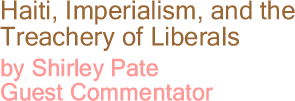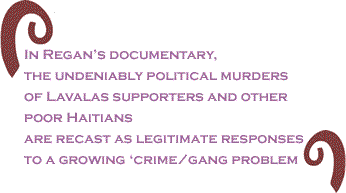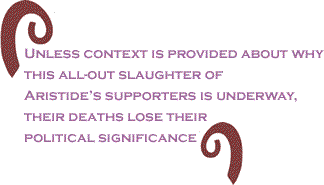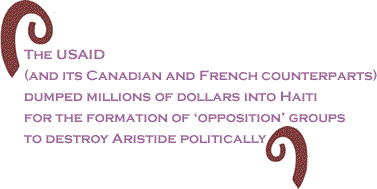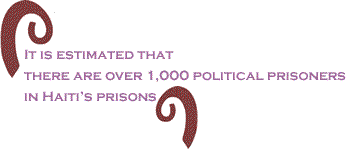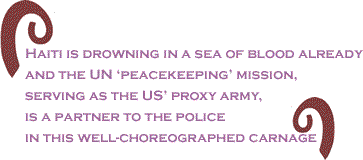
|
|||||||||||||||||||||
|
|
What liberals choose to overlook is dangerous. “Unfinished Country,” a film about Haiti by Jane Regan, aired on PBS on September 6. I’m not sure if I have seen a documentary so devoid of context. For the life of me, I don’t understand how one can discuss present day Haiti without chronicling the several-year, international effort to destabilize the country that involved a full-court press by: the US Agency for International Development (along with its French and Canadian counterparts) and its funding of the National Endowment for Democracy (and associated NGO-like tentacles); Washington free-market policy wonks; US State Department officials Colin Powell, Condi Rice and Roger Noriega; US-trained and funded paramilitaries and the stooges in the Dominican Republic that hosted them; Haitian elites; fake Haitian human rights organizations; the duplicitous US Embassy staff in Port-au-Prince; the IMF; and the World Bank. The initial goal of the destabilization campaign was two-fold: first, remove Aristide from power and second, systematically “eliminate” his abundant political support (largely, the poor) to pave the way for a Haitian elite victory in the next presidential elections. Regan’s failure to provide this vital background in her film leaves the viewer little context for what is taking place in Haiti today. Not only is this omission inconceivable, it is dangerous.
It is dangerous because the “elimination” of Aristide’s supporters involves summary executions by Haitian National Police (HNP), deadly raids in poor neighborhoods by United Nations (UN) troops, and machete massacres by “attaches” or associates of the HNP. Unless context is provided about why this all-out slaughter of Aristide’s supporters is underway, their deaths lose their political significance. And, make no mistake; what’s happening in Haiti is political. The Context In 2000, Jean-Bertrand Aristide became president of Haiti for the second time. His first presidency, which he won with 67% of the vote in Haiti’s first democratic elections, was interrupted eight months after it began by a coup d’etat in 1991. His proposals to raise the minimum wage and to initiate literacy programs were more than the US and their Haitian elite partners could handle. Haitian death squads sealed the coup with a massive slaughter of his supporters. Aristide returned to power in 1994 and, in 1995, he disbanded the Haitian military, a historic tool of state repression. US officials assumed mistakenly that Aristide would not buck a plan to privatize all state-owned companies. When Aristide refused, the US signaled international lending institutions that it was time to withdraw loans made to Haiti. As was intended, the withdrawal of the loans was a major blow to the Haitian economy, yet Aristide did his best to continue expansion of social programs. At the end of his term in 1996, Aristide stepped down. After his second election as president, which Aristide won with 92% of the vote, Haiti remained under an economic aid embargo. Yet, Aristide made good on proposals he put forth during his first term in office. In 2001, he mandated that 20% of Haiti’s budget be dedicated to education. In 2003, he doubled the minimum wage. His determination to improve the lives of all Haitians was a red flag waved in front of the imperialist bull. In another key destabilization tactic, the USAID (and its Canadian and French counterparts) dumped millions of dollars into Haiti for the formation of “opposition” groups (mainly from the ranks of the business elite) to destroy Aristide politically. At the same time, the US was amassing and arming paramilitaries in the Dominican Republic – most were former soldiers from the Haitian army that was dissolved during Aristide’s first term – in preparation for a “rebellion.”
The final tentacle of this plan was an indictment of Aristide through the press. US operatives wrote the copy for news stories and funneled it to members of the international press who were more than willing to publish the stories without question or analysis. The stage was set. Shortly before the coup, the US landed Marines in Haiti to provide the muscle for the US embassy staff, already engaged in directing the coup, to ensure that Aristide was kidnapped successfully and put on a plane to the Central African Republic. After Aristide’s forced departure, the remainder of the multi-national force, consisting of US, French, Canadian and Chilean troops, invaded and occupied Haiti. With the occupation established, the elimination of Aristide supporters at the hands of the multi-national force and the Haitian National Police began in earnest. Specific targets for many of the attacks were, and still are, two of the poorest neighborhoods in Port-au-Prince: Belair and Cite Soleil. The US never planned to be in Haiti long, partly due to the criticism it was receiving about its invasion and occupation of Iraq, and partly because it had made arrangements already for a force to succeed it. The US, working through the UN Security Council, cleverly engineered a UN “peacekeeping” mission to replace the multi-national invasion force. It was a brilliant idea to use UN “peacekeepers” for this bloody occupation. Many would not catch on until it was too late that the “peacekeepers” would become soldiers in the US’ proxy army and their purpose in Haiti would be to continue with the “elimination” of Aristide’s supporters. In June 2004, under the leadership of Brazil, the United Nations Stabilization Mission in Haiti (known by its French acronym – MINUSTAH) arrived in Port-au-Prince. Haiti’s second occupation in four months was underway. On the Haitian side of the equation, the minuscule elite class, whose opposition to Aristide continues to be funded by the USAID, are allied with the US’ illegal, immoral puppet government in Haiti in hopes that its murderous state security apparatus will preserve their free-market joy ride. Throughout these deadly occupations, Aristide supporters have continued to mount one demonstration after another demanding his return. Early on, the police response to these demonstrations took on a disturbing pattern. Hiding behind parked cars or in alleyways along parade routes, police began to fire on demonstrators randomly. The intention to kill was obvious. Many demonstrators died of gunshots to the head. Time after time, the UN troops stood by and watched or conveniently disappeared just before the police were about to open fire. To justify their actions, the police falsely accused the murdered demonstrators of having been armed criminals. Police have planted weapons next to the dead bodies of their victims as well. The HNP and the MINUSTAH seemed to work in tandem from the start. The troops served as lookouts along the perimeter of poor neighborhoods as the police conducted raids that often featured summary executions. Finally, MINUSTAH graduated to doing raids on its own. Perhaps the most heinous of these is MINUSTAH’s raid on July 6, when 300-400 troops attacked the residents of Cite Soleil in the middle of the night with tanks and at least one helicopter. The UN claims that they raided the neighborhood in an effort to arrest “gang member,” Dred Wilme. Going after Wilme had a two-fold purpose: first, Wilme was a dynamic, young community leader and Lavalas supporter who condemned the Haitian National Police, MINUSTAH and Haitian elite for their various roles in the rotating slaughters of the residents of Cite Soleil. Wilme exhibited all the characteristics of a leader capable of organizing the poor in Cite Soleil to resist the state-sponsored terror. Because of this, Wilme had to be eliminated. The second reason for going after Wilme was that he provided the UN with the cover they needed – ridding Cite Soleil of a “criminal” - to unload massive weaponry as part of a massacre on an entire neighborhood. MINUSTAH’s murder of Wilme and its full-throttle attack on Cite Soleil were meant as warnings to poor, Lavalas supporters throughout Haiti—“don’t think about engaging in a resistance movement.”
Witnesses and victims of this horrendous attack have stated in video footage taken the day after (see Kevin Pina’s film, Haiti: The Untold Story) that the raid was conducted by UN troops firing indiscriminately into homes and shooting residents in the back as they ran for cover. While the exact number cannot be known, it is estimated that upwards of 50 or 60 residents were killed and countless more were wounded. Women and children were among the dead. Physicians from Doctors without Borders, who operate a hospital in Port-au-Prince, said they received 26 wounded people later on that day - 20 of them were women and children. Throughout the post-coup period, Lavalas supporters, and poor Haitians in general, have been the victims of mass illegal arrests. It is estimated that there are over 1,000 political prisoners in Haiti’s prisons. Most of the political prisoners are being held without charge or on trumped up charges. Prominent individuals have been jailed because of their membership in or support of the Lavalas Party and demand that Aristide be returned to Haiti. These include activist and singer, So-Anne Auguste; Aristide’s former prime minister, Yvon Neptune; and priest and Lavalas leader, Father Gerard Jean-Juste. Recently, it was confirmed that Haitian authorities have rounded up children in mass illegal arrests and are holding them in various locations throughout Port-au-Prince. Some of these children are as young as 10 years old and many of them are orphans. Several have been locked up since a few days after the coup – nearly eighteen months. The Spin Of the millions of dollars poured into Haiti as part of the destabilization plan, a considerable amount was devoted to shaping public opinion about Aristide and his followers. Some of the money was directed at training programs for Haitian journalists and some was spent cultivating journalists who write for international publications. In addition, much effort was devoted to planting stories and editorials in major US newspapers to rally American support for the coup. The US State Department propaganda machine that coordinated and fed all of these efforts fixated on demonizing Aristide. Perhaps the most ridiculous lie spread about Aristide, in an obvious attempt by the State Department to capitalize on white fear of a black Haiti and its vodou religion, was a portrait of Aristide as a devotee of ritual sacrifice involving babies. His young, largely poor followers were labeled as “chimeres” (the original meaning is “mythical, fire-breathing monsters”, but when applied to Aristide supporters its meaning is closer to “thugs”), a word first introduced by an American journalist who was, no doubt, in close contact with the State Department.
Another aspect of the “spin” on Haiti is downplaying of the political. In Regan’s documentary, and in most of the conventional media, Haiti is viewed through a sociological prism in which the country’s problems are boiled down to a neat cycle of poverty, gang violence, crime and more poverty. Through this prism, the undeniably political murders of Lavalas supporters and other poor Haitians are recast easily by slick public information officers for the Haitian National Police, the international cabal, and the UN into legitimate responses to a growing “crime/gang problem.” This hoax allows the US, French, and Canadian footprints to fade from the canvas and the UN troops seem less like occupiers and more like, well, peacekeepers. How can the situation in Haiti, in which the US, France and Canada spent millions of dollars to de-stabilize Aristide’s government and where the UN has marshaled as many as 300-400 troops at a time to commit deadly raids, be characterized simply as a police action to counter “criminal elements” in poor neighborhoods? The answer is that it can’t because this scenario is a propaganda fabrication. On the day after Regan’s film aired, she participated in an online discussion about her film. When challenged by a critic for not addressing the coup d’etat that ousted democratically elected President Aristide, she stated:
There is little mystery here. Anyone who knows a lick about Haiti understands why this is happening. It is the same reason France occupied Haiti in the late 1700’s and the same reason US Marines occupied Haiti from 1915 to 1934 – imperial domination. Another critic pressed Regan further about her omission of the US role in destabilizing Haiti and the kidnapping of Aristide. Regan provided a bizarre, but revealing response:
Which was it? Did she originally include footage about the imperialist web of deceit that facilitated Haiti’s most recent descent into hell but WNET decided to cut it? Or, in hedging her bets about how to fund her film, did she make a conscious decision to omit this vital political background altogether? The Treachery of Liberals
I can’t know for sure what motivated Jane Regan to make her film, “Unfinished Country” (it should have been titled, “The Guy Philippe Show,” with all the footage devoted to the preening, human rights abusing, US-backed “rebel leader” who now dons business suits and visions of becoming Haiti’s next President). But, I speculate that her freakish, patronizing (what is an “unfinished country,” anyway?) portrait of Haiti was intended to be just that. However, for the imperialists, Regan’s film is a diamond in the rough. It voids all memory of how and why Haiti got screwed (how Haiti always gets screwed). It will be another piece of imperialist propaganda that will be aired around this country to keep us looking the other way as the killing field in Haiti widens. This film, and others like it, will bring together a corps of misguided liberals who believe that, in spite of the massive evidence to the contrary, the UN presence in Haiti is that of a benign peacekeeping force rather than a murderous occupier and that the coup d’etat that removed Aristide was the result of an internal squabble rather than an illegal, deadly violation of Haiti’s sovereignty by the US, France and Canada. In this particularly conservative political climate in which the US government funds the bad guys through the National Endowment for Democracy and money for Haiti (and other) solidarity work is all but dried-up, some activists are selling their souls to keep their organizations afloat. For some, the price may seem right, but for the people on whose behalf they claim to work, it is a cruel betrayal. Liberal meets capitalism and makes the wrong choice. Many organizations that traditionally fund solidarity movements seem to be experiencing financial difficulties causing some activists to turn to larger, more mainstream funding organizations. These larger funders tend to be run by liberals, but their core set of contributors is increasingly conservative. As might be expected, these funders are applying significant pressure to solidarity groups to de-politicize their messages and activities. Hence, solidarity work takes on a distinct “human rights” tenor and focus shifts to counting the bodies and mounting campaigns to spring “high profile” political prisoners from jail. Less and less is said about why people are being killed or why massive illegal detentions of ordinary citizens are taking place. Further, the rhetoric, so necessary to enlist the solidarity of others, must be “cleansed” so that concepts such as racism and its monster partner, imperialism, are no longer part of the discussion. Either because funders advise it, or solidarity organizations think they need it, considerable effort is devoted to attracting mainstream members of Congress to the cause. In the case of Haiti, it seems clear that the solidarity movement has about all the friends it’s going to get in Congress – these are the same members who have been supportive all along and who, throughout their careers, have taken consistent stands against US imperialist forays around the world. Softening the message may help get a foot in the door of a potentially sympathetic, more mainstream member of Congress, but before long the cause will be betrayed.
The betrayal will be captured on C-SPAN as the lobbied member recommends legislation to bring more US-owned sweat shops to the global south or announces that an obviously fraudulent election, such as the one that is about to unfold in Haiti, is free, fair and legitimate. The US Congress is a pillar of imperialism and, only in a very few cases (Haiti is one), are there brave members who will stand shoulder to shoulder in solidarity with you. Liberals are treacherous because many never learned their history. Or, if they did, they forget it when it is expedient. Liberals cannot grasp the fact that the keepers of imperialism – governments, corporations, elected representatives – are not going to help us get rid of its ravages. We grew up in a country that has a lengthy imperialist resume, yet we still don’t understand how it plays on the other end and what lessons it might offer us here. If you know your history, you know that the same thing that toppled Jacobo Arbenz in Guatemala and Mossadegh in Iran is the same thing that killed Patrice Lumumba in the Congo and Salvador Allende in Chile. It is the same thing that has blockaded Cuba for over forty years and threatens an invasion of Venezuela today and it is the same thing that kidnapped a beloved leader and democratically-elected President of Haiti on February 29, 2004. The culprit has always been, and forever will be, imperialism. Talk to any solidarity activist from the global south and you will be advised not to waste time petitioning elected representatives whose re-election coffers are filled with contributions from corporate elites. You will be warned not to trust UN peacekeeping efforts because the permanent members of the UN Security Council use them too often as proxy armies to fulfill imperialist objectives. You will be encouraged to seek alliances throughout the world with other solidarity groups and you will be reminded that the struggle is not about you, but about the people who are under the gun, facing the repression and waking up every day to fight anew. Resistance to Imperialism and Our Role When you see the lengthy historical trail and the harm imperialism inflicts throughout the world, you can appreciate what I believe is one of the most efficient and successful anti-imperialist forces in recent memory – the indigenous people of Bolivia. Former Bolivian president, Gonzalo Sanchez de Lozada, who grew up in the United States (he speaks Spanish with an American accent) decided in 2003 (along with his US cronies) to privatize the country’s gas reserves by initiating a government contract with a transnational consortium to export the gas to the US by way of Chile and Mexico. The consortium, Pacific LNG, is made up of British, Spanish, and Argentine corporations. A US company held the contract to transport Bolivian gas from Chile to Mexico. Within three weeks of de Lozada’s attempted sell-out of the country, the people of Bolivia sent him packing. In responding to this threat to their sovereignty, the people of Bolivia did not petition members of their legislature for help because they understood that many of its members had something to gain from the privatization. They were not naive enough to think an election would drive out de Losada and other traitorous politicians -- how else could a series of privatizing capitalists with the mentality of white men continue to hold the presidency in this largely Indian country unless the elections are perpetually rigged?
No, they got the bastards out by marching, blocking roads, raising hell for weeks and not stopping. The de Lozada government did not help itself when it sent the Bolivian army into the fray, killing over 70 protesters. Like most victims of perennial imperialism in the global south, the Bolivians had nothing left to lose. You either fight back or you die. They know that it is a tactical mistake to enlist the keepers of imperialism in their fight. This is something too many people still don’t understand well here in the US. In the case of Haiti, its solidarity movement will have to make some tough choices ahead regarding its underlying philosophy and tactics to be used for furthering the cause. In the meantime, Haitians will continue to die and liberals within and outside the movement will continue to chastise those who advocate withdrawal of the UN “peacekeeping” troops because they believe the UN is the only thing that will protect Haitians from an all-out slaughter by Haitian National Police. It’s too late. Haiti is drowning in a sea of blood already and the UN “peacekeeping” mission, serving as the US’ proxy army, is a partner to the police in this well-choreographed carnage. Ask any victim of the July 6, UN troop massacre in Cite Soleil if they want the “casques bleus” (referring to blue-helmeted UN “peacekeeping” troops) to leave. The next major struggle within the Haiti solidarity movement will come as the resistance to the occupation grows. I am certain that liberals will denounce it based on non-violence grounds just as they denounced the Palestinians’ right to resist the murderous Israeli occupation. Our role, as solidarity activists, is to help others understand what imperialism is and to call it by name consistently. We must connect dots so that those who wish to join our movement understand, for instance, that the occupations of Palestine, Iraq and Haiti are related. We must acknowledge that resistance may involve violence and that the only people that can decide whether, how, when and in what form are the Palestinians, the Iraqis and the Haitians. We must do our part by never softening the message, diluting the truth, nor de-politicizing the reality. Our solidarity work must be centered on fighting imperialism and racism and the core of our strategy must involve international alliances with other anti-imperialist groups. There are too many lives on the line to do otherwise. Shirley Pate is a Haiti solidarity activist in Washington, DC. She can be reached via email at [email protected]. |
|
| Home | |
Your comments are always welcome. Visit the Contact Us page to send e-Mail or Feedback or Click here to send e-Mail to [email protected] e-Mail re-print notice
If you send us an e-Mail message we may publish all or part of it, unless you tell us it is not for publication. You may also request that we withhold your name. Thank you very much for your readership. |
|
| October20 2005 Issue 155 |
|||||||||
|
|||||||||
|
|
|||||||||
| Printer Friendly Version in Plain Text or PDF format. Download free Adobe Reader. | |||||||||
 |
|||||||||
 |
|||||||||
| |
|||||||||
| |
|||||||||





















